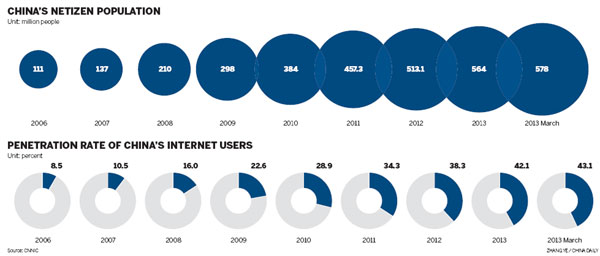In their own coin
Updated: 2013-06-07 09:11
By Wu Yiyao (China Daily)
|
|||||||||||
"However, I don't think this situation will last long. If the market value of bitcoins expands to a certain degree, it is strong enough to present a stable price," he says.
For many bitcoiners in China, the acceptance of bitcoins can be further expanded and more groups of people can get involved in the digital currency system.
Guo Wei, a shoe dealer who announced that he would accept bitcoin payments, says currently most of his revenue is still from online bank payments and cash.
"Some people ask how to pay with bitcoins just out of curiosity but pay with cash or bank cards," he says.
Sun Yan, a 22-year-old holder of bitcoins in Wuhan, says he believes that even if bitcoins fail to achieve widespread recognition and survive in the long term, it is meaningful in that it pushes forward the development of digital currency. Sun holds three coins, all of which were bought from online traders.
"Just as bank cards in many ways have replaced banknotes, digital currencies will do the same thing. All we need is a wider network that accepts digital currency," Sun says.
Risks remain
Chang says he and many other bitcoiners have been aware of the potential risks of holding bitcoins. One possibility is that governments may decide bitcoins are illegal and conduct a crackdown on the exchange platform.
The US Commodity Futures Trading Commission is exploring whether bitcoins fall under the United States regulator's purview, reported the Financial Times.
"It's not monopoly money we're talking about here. Real people can have real risks with these instruments so we need to ensure that we protect markets and consumers even in what at first blush appear to be 'out there' transactions," said Bart Chilton, one of the five commissioners at the US Commodity Futures Trading Commission, the Financial Times reported on May 7.
For bitcoiners in China, the news is a signal that the currency may become more widely accepted.
"Putting bitcoins under regulation means they are not regarded as something outlawed and so they are recognized as a currency. If authorities want to see the currency die, they can just announce it is illegal," Chang says.
Wang Yujie, a 27-year-old wealth manager in Shanghai and a holder of bitcoins, says he has considered the possible risks that may affect the value of his bitcoin deposits.
"It may become illegal if the authorities announce as much. It may be replaced by more advanced digital currencies. Individual e-wallets may be hacked and people will worry about safety issues. The entire system may be corrupt," Wang says.
In March, a branch of the US Treasury Department said all exchanges or transfer platforms of bitcoins will be considered as "money services business", which means companies involved must provide information to the government and introduce policies to prevent money laundering. Since then, at least three companies in North America have reported having their business accounts closed by their banks. Bitfloor, a New York-based Bitcoin exchange, says it is shutting down entirely and has not yet been able to return funds to customers.
In China, the transferring and trading platforms of bitcoins are run by individuals and the prices and exchange rates are affected by overseas platforms, Shen says.
|
||||
"The safety of trading bitcoins on these platforms mainly relies on people's trust and good faith," Shen says.
Wang says he has explored the currency and understands how it works because some clients asked him whether bitcoins are worth investing in.
"My answer to my clients at the current stage is: 'Wait for another year to see how regulators may respond to it' because I regard it as a big risk if bitcoins are declared illegal," he says.
The mechanism of bitcoins, which challenges many banking industry insiders' current knowledge and understanding of currencies, may be obscure to wealth managers and investors even if they have decades of expertise in investments in traditional areas.
"Bitcoins are highly technical in almost every step from their issuance to payment. It takes time for people to understand how the system works and decide whether it is worth real money," Wang says.
The issuance of bitcoins based on computational calculation sets a benchmark that is too high for investors without much knowledge or interest in information technology, says Liu Xinyue, an investor in gold and silver futures in Shanghai.
"I heard my son talking about the bitcoin and I got a headache just two minutes after he started explaining it. It's all too complicated and bizarre to me. I think this may be one of the biggest barriers for investors like me," Liu says.
wuyiyao@chinadaily.com.cn


( China Daily European Weekly 06/07/2013 page1)
Today's Top News
List of approved GM food clarified
ID checks for express deliveries in Guangdong
Govt to expand elderly care
University asks freshmen to sign suicide disclaimer
Tibet gears up for new climbing season
Media asked to promote Sino-Indian ties
Shots fired at Washington Navy Yard
Minimum growth rate set at 7%
Hot Topics
Lunar probe , China growth forecasts, Emission rules get tougher, China seen through 'colored lens', International board,
Editor's Picks

|

|

|

|

|

|







